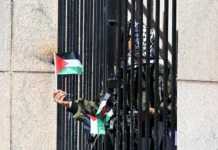Property belonging to Holocaust survivors and their descendants have yet to be returned to their rightful owners, in addition to restitution to these people, is an issue largely unresolved 70 years after the end of the Shoah, according to the U.S. State Department in an annual report released on Wednesday.
“As we mark the 75th anniversary of the end of the Holocaust and more than 10 years after the adoption of the Terezin Declaration, the legacy of the Nazis’ mass looting and subsequent Communist-era nationalizations of such property, remains largely unaddressed in too many places,” said U.S. Secretary of State Mike Pompeo in a statement.
The Terezin Declaration was created in 2009 after a meeting of 47 countries, including the United States, in June that year in the Czechoslovakian town where 33,000 Jews perished at the Theresienstadt ghetto and concentration camp. The member countries signed a declaration stressing the importance of restitution for Holocaust survivors and their heirs.
Pompeo said the report “details the critical work that remains to be done to provide a belated measure of justice to Holocaust survivors and their families, and to Jewish communities destroyed by the Holocaust. Given the advanced age of survivors around the world—many of whom at poverty levels—the need for action is urgent. All victims of the Nazi regime should be able to live out their remaining days in dignity.”
The report blamed “bureaucratic inertia” for the delay in resolving restitution claims. It calls out Bosnia and Herzegovina, Belarus and Ukraine for not passing laws to enable the restitution of private property; and Poland for not passing laws dealing with restitution of private property confiscated during the Holocaust, making it “the only European Union member state with significant Holocaust-era property issues not to have done so.”
Also in Poland, “approximately half of the 5,500 Jewish communal property claims filed under a 1997 restitution law remain unresolved, and approximately half of the adjudicated claims were rejected.”
‘Countries should live up to their pledges’
U.S. Special Envoy for Holocaust Issues Cherrie Daniels told JNS during a call with reporters on Wednesday that the United States is “still having discussions” with Poland on the issues of restitution for Holocaust survivors, though she noted progress Warsaw has made on treating Holocaust survivors from Poland regardless of where they live in the world, including issuing monthly pension payments.
Meanwhile, in Romania, “Holocaust-era private property legislation exists, but the claims process has been difficult for U.S. and foreign citizen survivors and, in practice, has made it nearly impossible for people outside the country to qualify,” according to the report.
It blamed “bureaucratic inertia” for the delay in resolving restitution claims.
In Croatia, restitution efforts for “communal and religious properties confiscated, destroyed or nationalized in the Holocaust or Communist eras” have been “complicated by the fact that many buildings were used for communal rather than religious purposes or were owned by a legal entity that was separate from the official Jewish community,” according to the report.
“Most Holocaust survivors and heirs have not been able to file private property claims under Croatia’s restitution law because of citizenship restrictions and other procedural hurdles, and there is a general lack of political will to address the issue,” states the report. “Bureaucracy, weak political will and related issues have hindered resolution of Jewish communal property claims in many countries.”
Moreover, the report accuses Russia of doing little to resolve the issue of art recovered at the end of World War II, belonging to Jews and non-Jews, which was confiscated by the Nazis.
Nonetheless, the report praises countries for making progress on the issue of restitution to Holocaust victims and their descendants.
It names Austria, France, Germany, the Netherlands and the United Kingdom for establishing dispute mechanisms to resolve art claims; and Germany for allocating “significant funds to both public and private museums for provenance research and has informed its public museums that they cannot continue to obtain federal funds unless they participate in the claims process.”
The World Jewish Restitution Organization and Latvian Council of Jewish Communities welcomed the report.
“As the JUST Act report makes clear, Holocaust survivors and Jewish communities continue to wait for justice for property that was wrongfully taken from them,” said World Jewish Restitution Organization chair of operations Gideon Taylor. “Even in these hard times, countries should live up to their pledges to address the material wrongs of the Holocaust while the remaining survivors are still alive.
“Amid the coronavirus pandemic, all must be done to care for vulnerable Holocaust survivors, many of whom live on limited incomes and are in poor health,” continued Taylor. “We are proud of the work that our member organizations are doing on the ground every day to assist Holocaust survivors and others during this crisis.”
“A report like this helps countries understand where they stand on the global stage,” said Dmitry Krupnikov of the Latvian Council of Jewish Communities in a statement.


























